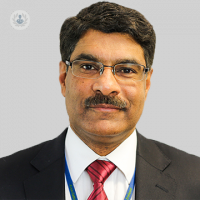A whole new world for haemorrhoid surgery
Written by:Haemorrhoids or piles are an irritating and often painful condition affecting many people. These little lumps around the anus are in fact swollen blood vessels, which can become inflamed, leading to itching, soreness, bleeding and swelling. If the symptoms become significant enough to affect the patient’s life and other treatments aren’t working, a haemorrhoid may need to be surgically removed. Top surgeon Mr Arif Khan explains the different approaches to haemorrhoid surgery:

What does modern haemorrhoid surgery look like?
Symptomatic haemorrhoids or piles can be Grade I (with minimum bleeding and no prolapse) to Grade IV (with recurrent bleeding and marked haemorrhoidal prolapse). Surgery for symptomatic piles is indicated for Grade II – IV haemorrhoids.
Surgery for haemorrhoids has revolutionised over the last 10 years. Before a few decades ago, open haemorrhoidectomy or Milligan-Morgan haemorrhoidectomy was the treatment of choice for Grade III and IV haemorrhoids. This procedure required general anaesthetic and left the patients with a large wound around the back passage. Patients would experience recurrent bleeding and pain after the procedure up to six weeks. The wounds required a long time to heal, resulting in a prolonged recovery time.
Following open haemorrhoidectomy, stapled haemorrhoidectomy used to be a procedure that was relatively less invasive; however the procedure lost popularity due to problems of sepsis, urgency of stools and incontinence experienced by the patients.
Now modern haemorrhoid surgery is being performed by trained surgeons in a few centres. The procedure is called Doppler-guided haemorrhoidal artery ligation (also known as the THD procedure or HALO procedure). The latest technology has made it possible to reduce the blood supply to the haemorrhoids without cutting or resection. The procedure has a high success rate of around 85-90% and a low recurrence rate. As no cutting is required, the procedure is relatively painless, and the incidence of sepsis and incontinence are negligible. The majority of patients can return to work after 48 hours.
What new types of haemorrhoid surgery are being investigated?
The new procedure for treatment of symptomatic (Grade II – IV), is called Doppler-guided haemorrhoidal artery ligation (THD or HALO procedure). This new procedure was developed with the extended use of modern ultrasound technology to locate the precise position of the arterial blood supply to the haemorrhoids. The procedure localises the blood supply to the haemorrhoids and the inflow to the haemorrhoids is minimised by ligating (tying with a stitch) the blood vessels, thus shrinking the piles. Further developments are currently being made with the equipment and our patients will benefit from them in near future.
If there’s a promising form of surgery on the horizon, when might patients start to benefit from the procedure?
Further developments are also being made in the use of laser and infra-red radiation in the treatment of haemorrhoids. These modalities have already been tried, and can be performed in an outpatient setting, but have a higher recurrence rate.
What are the non-surgical options for haemorrhoids treatment?
Non-surgical treatment for haemorrhoids is cost and time saving. Techniques usually performed in patients suffering from early haemorrhoids (Grade I-II) include haemorrhoidal ointments, rubber band ligation of haemorrhoids and infrared coagulation.


